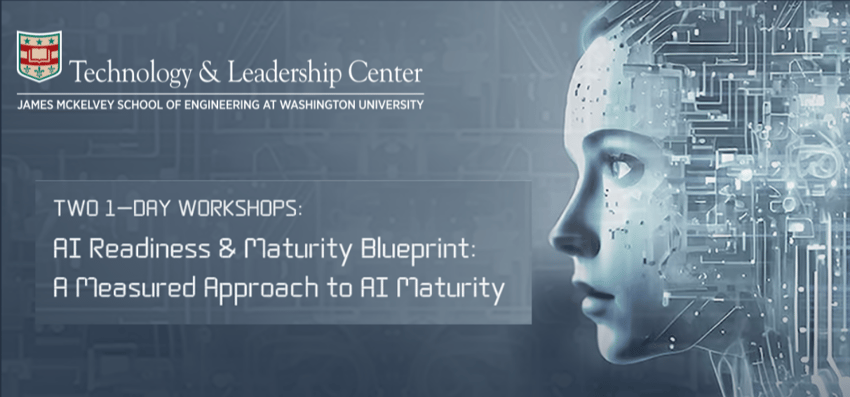
AI Readiness & Maturity Blueprint: A Measured Approach to AI Maturity
Workshop Overview
In the rapidly evolving landscape of business and technology, the AI Readiness & Maturity Workshop is designed to help organizations navigate the complexities of artificial intelligence implementation.
This hands-on workshop equips attendees with the tools and frameworks needed to understand their current organizational and technological state as it applies to AI.
The workshop takes a holistic view of AI transition and addresses the technical, data, human resource, and governance aspects of enterprise-centric AI adoption. As such, participants receive both an education in and a launch plan for achieving excellence in AI adoption and use.
The workshop is anchored in the AI Maturity Matrix, a diagnostic tool that guides participants through the stages of AI maturity, from initial exploration to full-fledged implementation, including metrics and benchmarks.
Participants will leave the workshop with a deep understanding of their organization's AI maturity, the gaps they need to address, and the resources required for AI implementation. They will also receive a tailored set of strategic insights and an action plan for their unique organizational context.
Download the Slides from our AI Webinar
and
Request Information

Professor of Practice and Academic Director
Jeromey was born and raised in the Midwest (Indiana). He has a BS in Computer Science, MBA specializing in Supply Chain & Logistics, MS in Information Systems, and a PhD in Applied Mathematics. Prior to joining Washington University in St. Louis and Avanade, he held various positions including Managing Director at Slalom, Officer (VP) at the Federal Reserve Bank, and multiple management consulting positions with Nestle Purina, Edward Jones, Kynetec, Equifax, and Safety National. Jeromey’s expertise is in technology and data strategy and data science and he enjoys formulating and solving complex business problems to meet business and customer needs across many industries. In addition to his day job responsibilities, Jeromey is a Professor of Practice and Academic Director for the McKelvey School of Engineering at Washington University where he has launched two new Master programs in applied data science and applied computer science. He is actively writing and receiving grants, and teaches courses in deep learning, analytics applications, mathematics for data science, and enterprise data strategy.
- Landscape Overview: Grasp the profound impact and potential of AI integration across diverse industries to inform strategic decisions.
- AI Readiness Assessment: Acquire tools and knowledge to evaluate your organization's current state of AI preparedness and identify areas for enhancement.
- Maturity Matrix Mastery: Understand the stages of AI maturity, enabling participants to pinpoint their organization's position and the steps required for progression.
- Navigating AI Challenges: Learn strategies to mitigate common obstacles in AI transformation, from technical hurdles to organizational change dynamics.
- Crafting the AI Blueprint: Develop a concrete action plan tailored to your organization's unique needs, ensuring a smooth and effective transition towards AI maturity.
- The Landscape of AI in Business
- Understanding AI Readiness
- The AI Maturity Matrix Unveiled
- Navigating the Challenges of AI Transformation
- Workshop: Crafting Your AI Blueprint
- Panel Discussion: Lessons from the Frontlines
Discover a wealth of AI-related resources, events, and information from our collaborating organizations:
Did You Know?
More than 75% of companies are looking to adopt technologies like big data, cloud computing and AI in the next five years. World Economic Forum
AI, a key driver of potential algorithmic displacement, is expected to be adopted by nearly 75% of surveyed companies. World Economic Forum
Organizations currently estimate that machines perform 34% of all business-related tasks. Predictions indicate that 42% of business tasks will be automated by 2027. World Economic Forum